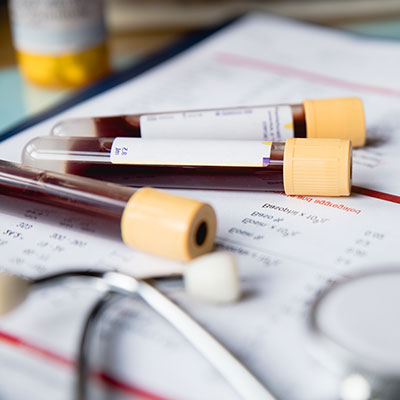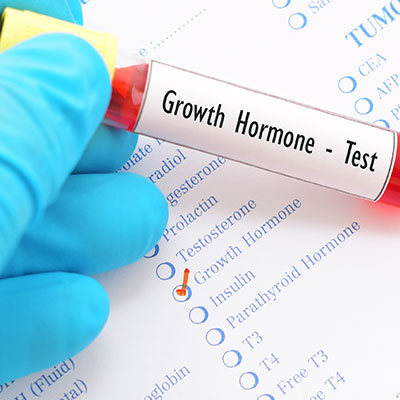
Growth hormone is essential for normal growth in children. Growth hormone, also known as HGH, continues to play a critical role in adults. HGH in adults is responsible for your ability to burn fat and build muscle. It is also essential for immune health, sexual wellness, and many other bodily processes.
Making a proper diagnosis of growth hormone deficiency starts with taking a complete medical history and then doing a physical exam. After that, if your doctor suspects that you might have a growth hormone deficiency, they will schedule one or more blood tests to determine the extent of HGH deficiency.
The blood tests for growth hormone deficiency include:
- Binding protein levels (IGF-I and IGFBP-3) blood tests to show whether the growth problem is caused by the pituitary gland
- Blood tests to measure the amount of growth hormone levels in the blood
- Blood tests to measure other levels of hormones the pituitary gland produces
- GHRH-arginine test
- Growth hormone stimulation test
- Insulin tolerance test
Why Do I Need a Test?
Growth hormone levels decline as you age. Many men and women over 40 could be suffering from an age-related growth hormone deficiency or GHD. GHD in adults can lead to tiredness, weight gain, lack of energy, and sexual health issues.
But the only way to determine if you have a growth hormone deficiency is with a blood test or other diagnostic tests that can be used to determine if your body is making adequate levels of growth hormone.
HGH Deficiency Testing Procedure

Instead of simply testing your blood for the amount of HGH in your blood at any given time, HGH stimulation tests introduce a medication that will stimulate your pituitary gland to release growth hormone. Once that drug is given, the level of HGH in your blood will be carefully monitored to determine if your body is producing enough HGH or not.
The other test we used most often to test your HGH is the Insulin-like Growth Factor-1 (IGF-1) test.
What is IGF-1, and How Can IGF-1 Be Used to Test for HGH Deficiency?
Our facility uses the IGF-1 test to diagnose growth hormone deficiency.
Insulin-Like Growth Factor 1 (IGF-1) is a naturally occurring protein that stimulates protein synthesis. It is sometimes also called somatomedin-C. Your growth hormone levels and your IGF-1 levels are closely related. It is the presence of growth hormone that stimulates the production of IGF-1 by the liver. Therefore, if your IGF-1 level is low, it can be used as an accurate indicator of a growth hormone deficiency.
Your IGF-1 and your other growth hormone levels and factors all decrease as you age. The IGF-1 blood test can give a clear indication of age-related growth hormone deficiency (GHD).
The IGF-1 human growth hormone test for GH deficiency will be performed by a lab technician. This procedure takes only a few minutes for the vials of blood to be collected.
Here are the steps that can be expected once taken back into the collection room:
- You will be asked to check the personal information provided (name, date of birth, address).
- The technician may look at both arms to find an appropriate vein – you can request a specific arm if desired.
- A tourniquet (large rubber band) will be tied around the upper arm.
- An alcohol prep wipe will clean the area to be used.
- A needle will be inserted into the vein, and a few vials of blood will be collected.
- The needle will be removed, and a piece of gauze and bandage will be placed on the site.
- Leave the bandage on for a few hours.
How to Prepare for the Test
How you prepare for your growth hormone test will depend on the test that you are given. Your health care provider may give you special instructions about what you can or cannot eat before the test. Your doctor may request one or more of the above HGH tests. Since there are some medications that can affect the results, please speak with your medical advisor about any prescription drugs you are taking, as well as any vitamin supplements that are also taken daily.
Generally speaking, to prepare for most growth hormone testing:
- You may need to take a specific medication prior to the test. If so, this will be prescribed for you.
- You may be asked not to exercise or eat anything for 10 hours before the test. Water is allowed.
- Depending on the specific test ordered, you may need to sit quietly for 30 minutes right before the test, or you may be asked to exercise for a few minutes just prior to testing.
Certain medicines can affect your growth hormone test results, such as corticosteroids and estrogen (including birth control pills). You may be asked to stop taking these medications prior to the HGH testing.
Drugs that can increase HGH levels include the following:
- Amphetamines
- Dopamine
- Methyldopa
- Estrogens
- Histamine
- Nicotinic acid
- Arginine
- Glucagon
- Insulin
Drugs that can decrease HGH levels include the following:
- Corticosteroids
- Phenothiazines which can inhibit dopamine (often used for psychiatric conditions to reduce hallucinations)
What Happens During the Test?
What happens during each test depends on the test being performed. During the IGF-1 test performed at our clinic, a blood sample will be drawn from a vein in your arm. Since HGH levels fluctuate throughout the day, we do not test for HGH but rather IGF-1. IGF-1 mirrors HGH excesses and deficiencies, but the level in the blood is stable throughout the day, making it a more useful indicator of average HGH levels than testing for HGH.
What Do the Results of an HGH Test Mean?
Since the normal level of HGH is not the same for all people, if an HGH blood test is used, your diagnosis of growth hormone deficiency is based on your HGH levels relative to Body Mass Index, or BMI.
Doctors use the following criteria to form a diagnosis of HGH deficiency in adults when using the growth hormone stimulation test:
- Peak HGH level less than11.1 mcg/L in patients with BMI less than 25
- Peak HGH level less than 8.1 mcg/L in patients with BMI of 25 to less than 30
- Peak HGH level less than 4.1 mcg/L in patients with BMI equal to or greater than 30
If the IGF-1 stimulation test is used, then a determination of GHD will be made per the following normal values.
| Adult Males Age | ng/mL | Adult Females Age | ng/mL |
| 18 years | 109-527 | 18 years | 114-493 |
| 19 years | 104-484 | 19 years | 105-441 |
| 20 years | 98-443 | 20 years | 97-398 |
| 21-25 years | 83-344 | 21-25 years | 84-323 |
| 26-30 years | 75-275 | 26-30 years | 77-271 |
| 31-35 years | 71-241 | 31-35 years | 73-244 |
| 36-40 years | 69-226 | 36-40 years | 68-225 |
| 41-45 years | 64-210 | 41-45 years | 62-205 |
| 46-50 years | 59-201 | 46-50 years | 56-194 |
| 51-55 years | 56-201 | 51-55 years | 53-191 |
| 56-60 years | 51-194 | 56-60 years | 45-173 |
| 61-65 years | 47-191 | 61-65 years | 41-168 |
| 66-70 years | 46-195 | 66-70 years | 39-168 |
| 71-75 years | 42-187 | 71-75 years | 36-166 |
| 76-80 years | 39-184 | 76-80 years | 35-168 |
| 80-85 years | 37-182 | 80-85 years | 35-179 |
| 85-90 years | 35-182 | 85-90 years | 33-179 |
Source: Mayo Medical Laboratories
Is There a Home Test for Growth Hormone?
No, there is no such thing as a home test for growth hormone deficiency. The only way to test for HGH deficiency is to use one more of the doctor-prescribed tests discussed on this page.
Other Exams and Tests to Diagnose Growth Hormone Deficiency
In addition to the various blood tests mentioned above, doctors use several other tests to diagnose growth hormone deficiency. These include:
- A dual-energy x-ray absorptiometry (DXA) scan measures your bone density.
- An MRI of the brain may be taken so your doctor can see the pituitary gland and hypothalamus.
- Hand x-rays (typically of the left hand) can also help show your doctor your bones. The shape and size of bones change as a healthy person grows. Your doctor can see bone abnormalities with this x-ray.
- X-rays of the head can show any problems with the bone growth of your skull.
Studies on Testing for Growth Hormone Deficiency
Medical science admits that making an accurate diagnosis of growth hormone deficiency is completed.
A 2012 study that compared the various methodologies used to test for HGH deficiency found that “Measurement of IGF-I and IGFBP-3 is diagnostically useful, particularly in combination with other diagnostic measures. Neuroimaging is also useful to inform diagnosis, as pituitary abnormalities suggest a higher likelihood of GHD persisting into adulthood.”
Now that you know a lot more about testing for growth hormone deficiency, why don’t you contact us today and find out about some of the other life-changing benefits of growth hormone therapy.
FAQ
Growth hormone deficiency (GHD) is a condition caused by insufficient amounts of growth hormone in the body. Children with GHD have abnormally short stature with normal body proportions. Adults with GHD can exhibit any number of debilitating symptoms, none of which are related to size.
The normal range for HGH level is typically:
- For adult males -- 0.4 to 10 nanograms per milliliter (ng/mL), or 18 to 44 picomoles per liter (pmol/L)
- For adult females -- 1 to 14 ng/mL, or 44 to 616 pmol/L
- For children -- 10 to 50 ng/mL, or 440 to 2200 pmol/L
Growth hormone deficiency is diagnosed using several possible diagnostic tests. The most common tests are an HGH blood test or an IGF-1 test.
An adult who is making too little growth hormone will have symptoms that include:
- A higher level of body fat, especially around the waist
- Anxiety and depression
- Decreased sexual function and interest in sex
- Fatigue
- Feelings of being isolated from other people
- Greater sensitivity to heat and cold
- Less muscle (lean body mass)
- Less strength, stamina, and ability to exercise without taking a rest
- Reduced bone density and a tendency to have more bone fractures as they get older
- Changes in the makeup of the blood cholesterol
Unlike other important hormones such as testosterone, your levels of HGH fluctuate throughout the day. This makes it difficult to make a diagnosis of growth hormone deficiency with a simple blood draw. More sophisticated diagnostic tests are required, such as those that test your body's ability to produce human growth hormone.
HGH tests are designed to see if your body is making enough HGH. HGH is a vital hormone critical to your health and wellbeing. If the results of your HGH test or tests indicate that you have a growth hormone deficiency, you may be prescribed growth hormone replacement therapy.
The safest and most effective way to treat a growth hormone deficiency is with growth hormone replacement therapy. HGH therapy is only given via injection. Prescription HGH injections are available under many names. Some of the most common growth hormone injections prescribed to treat GHD are:
- Genotropin
- Omnitrope
- Norditropin
- Humatrope
- Saizen
These differ only in their level of “quality,” their available dosages, and their delivery methods. Your medical professional will decide which is the right HGH prescription for you.
If your test results indicate that you have age-related HGH deficiency and you choose not to have the recommended therapy, your condition and your symptoms will only get worse, and you can expect an increasing decline in your quality of life.


